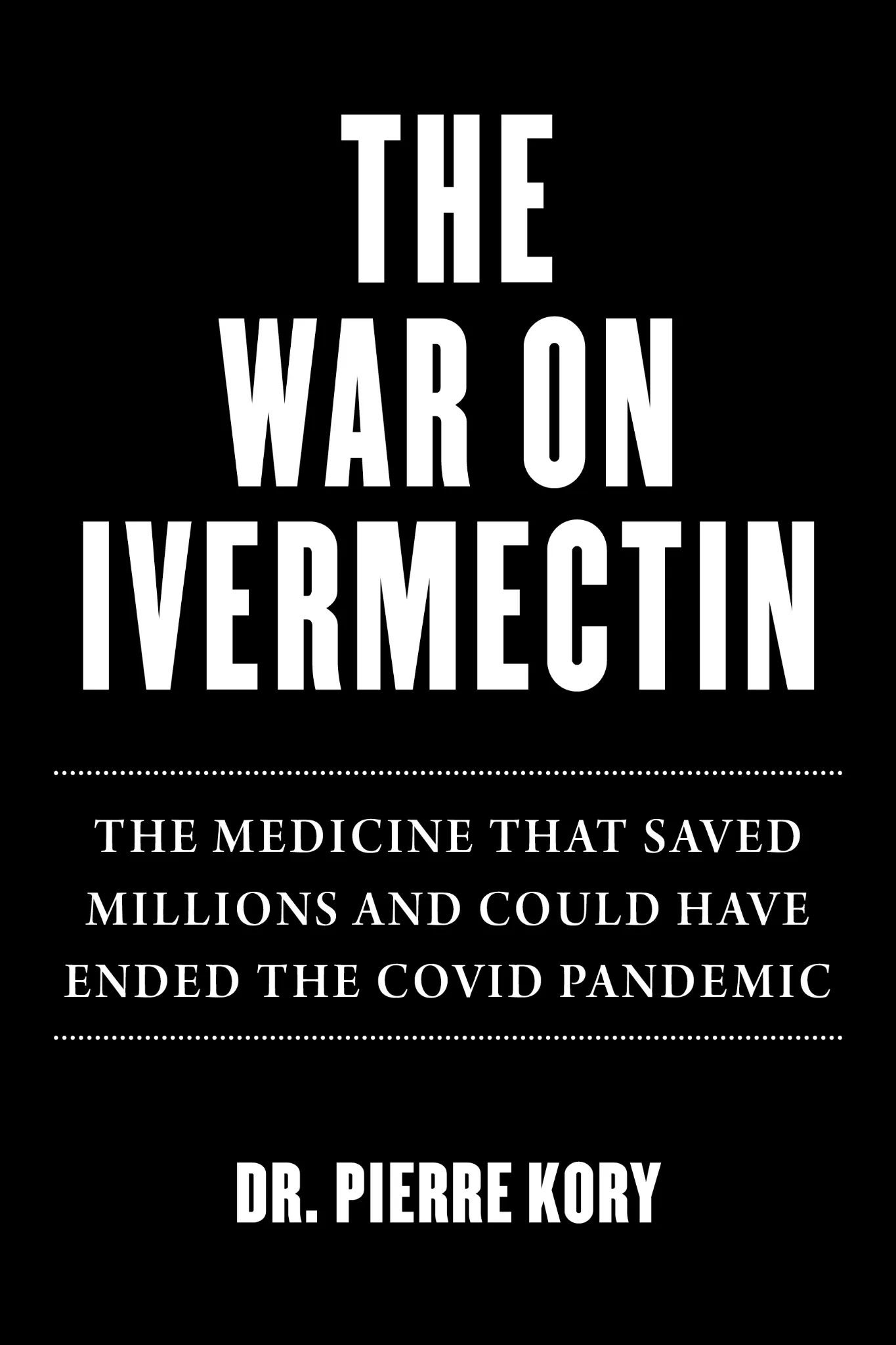While censoring positive studies of ivermectin, the journals published fraudulent studies to try to “prove” ivermectin was ineffective. It is a well-known Disinformation tactic called “The Fake.”
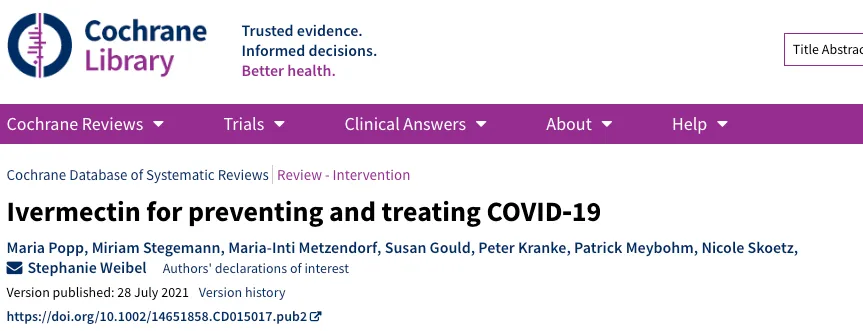
Here is the conclusion of the august (yeah right) Cochrane Library’s review:
“Based on the current very low‐ to low‐certainty evidence, we are uncertain about the efficacy and safety of ivermectin used to treat or prevent COVID‐19. The completed studies are small and few are considered high quality.”
Now, I am not making this up, but here are the findings of the paper:
- An estimated reduction in mortality of 67% for outpatients and 40% for inpatients. However, they made sure to include so few studies that these estimates did not reach statistical significance. How did they exclude so many studies and how did they choose which studies to include?
Ask Alexandros Marinos, the evidence-based medicine ivermectin fraud detective. It is not good. Also remember that Cochrane Library is (was) literally considered the gold standard for these kind of reviews prior to the pandemic:

Also recall that Bill Gates, for the first time, started giving the Cochrane Library money in 2016.
Random request to my subscribers (or Alexandros!): try to find how many medical journals BMGF funds and when did he give them money for the first time. For instance, the Frontiers Journals (whose Chief Editor retracted the FLCCC’s ivermectin review paper without giving details as to what we got wrong) added BMGF as a donor in 2018. My hypothesis: Gates was making moves to control the big journals in preparation for the pandemic or simply to further control the global health system to achieve whatever depopulation agenda he is purportedly getting on about.
Anyway, not long after Gates starts giving the Cochrane Library money, the most anti-Pharma Founder and Board Member, Dr. Peter Gotzsche, was fired from the Board. Cochrane tried to smear him with “hit jobs” in their media statements and in this article about his firing/resignation that appeared in the Lancet:
Gøtzsche thinks that the (Cochrane) collaboration is becoming increasingly centralized and commercialized, that the executive team has authoritarian tendencies, and that certain policies are not fit for purpose.
“1 year ago, I pointed out to a meeting of the governing board that it was totally unacceptable that up to half of the authors on a Cochrane paper can have direct financial conflicts of interest with those companies whose products they are reviewing”, he told The Lancet. “I wrote a new draft of the policy, but absolutely no meaningful action has been taken”.
In 2013, Gøtzsche published “Deadly Medicines and Organized Crime: How Big Pharma Has Corrupted Healthcare”. He is a long-standing critic of the pharmaceutical industry. He believes that Cochrane is vulnerable to pressure from the industry, and that his dismissal was partly driven by a desire to silence him. Cochrane denies this:
A statement on Cochrane’s website declares: “This Board decision is not about freedom of speech. It is not about scientific debate. It is not about tolerance of dissent. It is not about someone being unable to criticize a Cochrane Review.”
Listen to this video interview with Gotzsche:
Here he is explaining why large pharmaceutical companies meet the definition of organized crime: pic.twitter.com/um1FJJUQel
— Alexandros Marinos (@alexandrosM) October 18, 2022
Now, here is the scathing, erudite critique of the Cochrane meta-analysis from Edmund Fordham, Tess Lawrie, and Katherine MacGilchrist that they posted to a pre-print server for the world to read and that the world ignored. Insane. Love the title though:
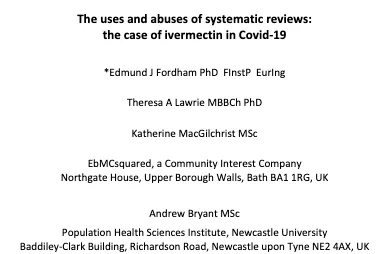
Edmund Fordham, the lead author of the paper, wrote this to me recently, its pretty funny although nothing is funny on this topic:
The critique of Popp et al is here, which probably deserves an update commenting on their latest update, “including” TOGETHER” even though they were supposed to exclude retrospectively registered trials, a clear review protocol violation, as Alex Marinos recently spotted.
We tried to get this published in International Journal Epidemiology, via Robert Clancy who is long-time friend and colleague of the EiC. They commented that it was very closely reasoned, but more suitable as Letter to the Editor in Cochrane. Except I don’t think Cochrane would do that (it’s the “Database of Systematic Reviews”), obviously they would not, after our experience in Jan 2021 (see prior post on what Cochrane did to Tess Lawrie et al here).
If you can suggest a different journal please do; we could use the Popp update as pretext and update our own critique.
We can do TrialSite and similar ad nauseam but it’s corruption of formerly rigorous and rational journals of record that we need to address.
Now, what is interesting is that Popp et al actually tried to defend themselves against Edmund and Tess’s critique with this insulting editorial published by, yep, you guessed it, the BMJ. The journal is literally called “BMJ Evidence Based Medicine.”

Edmund writes:
This was a “hit piece” by Popp et al. in BMJ trying to smear us with an “apples and oranges” comparison to which we succeeded in getting a rapid response published here which is corrupted in the concluding paragraph (there is no DOI reference for Rapid Responses and you just do a cut and paste of running text, but they are scrutinized editorially). The manuscript for the Rapid Response as originally submitted is here https://osf.io/nqxdk/
- Roman et al. Clinical Infectious Disease, March 2022
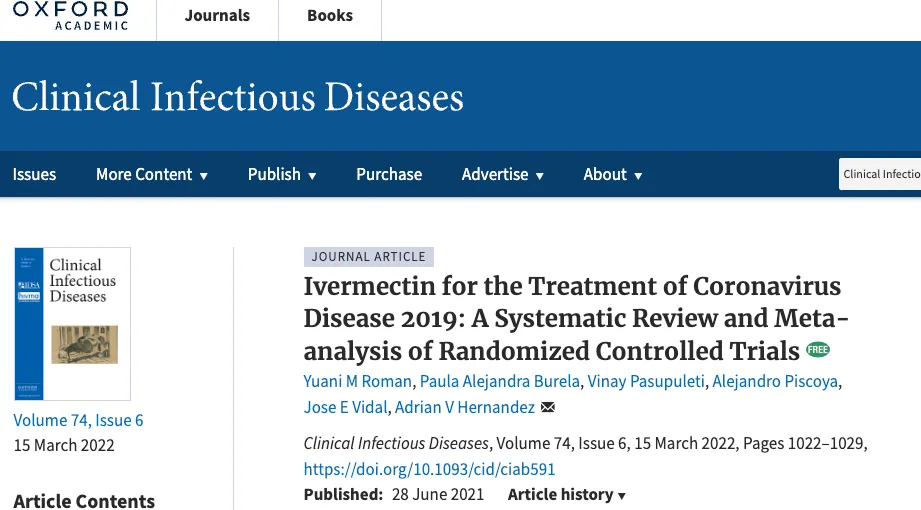
In this meta-analysis they found a 63% reduction in mortality that just misses statistical significance (on purpose). Please take a moment and ponder the implications of a 63% reduction in mortality with a low-cost, safe medicine. Anyway, “very low quality of evidence” is mentioned at every turn.
Edmund Fordham, Tess Lawrie, and Andy Bryant write an even more scathing critique, written as a letter to the Editor of the journal demanding a retraction. Again ignored by the world. I will include it in its entirety, and in its brilliance, so I ask that you read it, it is not very long. The fraud they point out is so brazen in that it points out that the authors of this review literally inverted the results of positive study findings to argue against ivermectin. Insane:
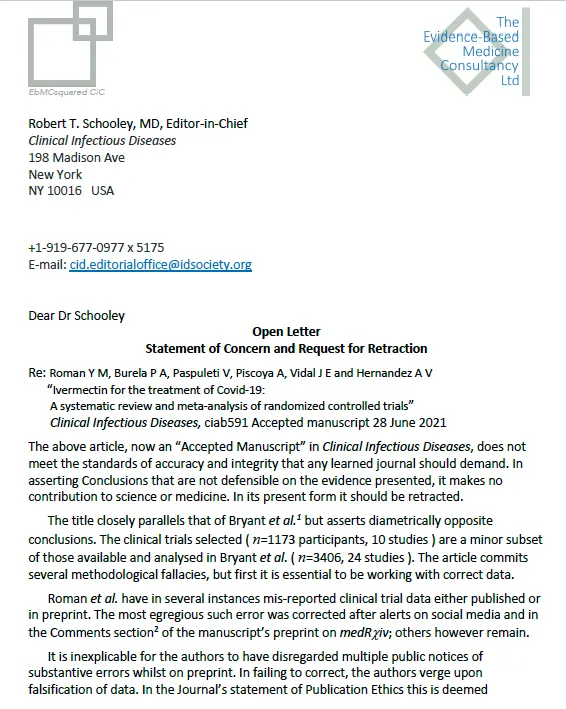
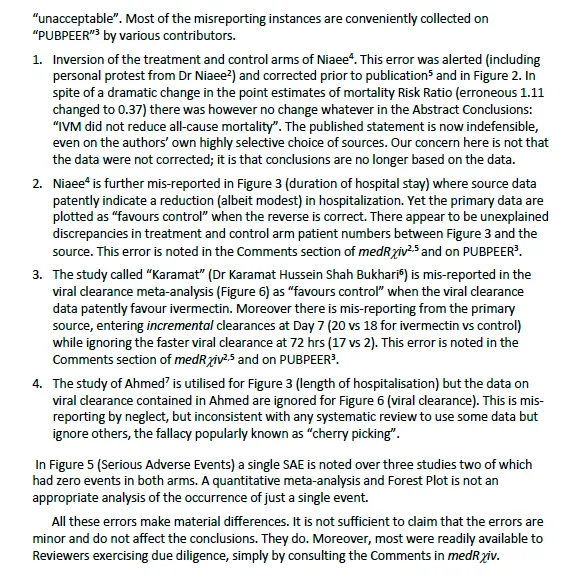
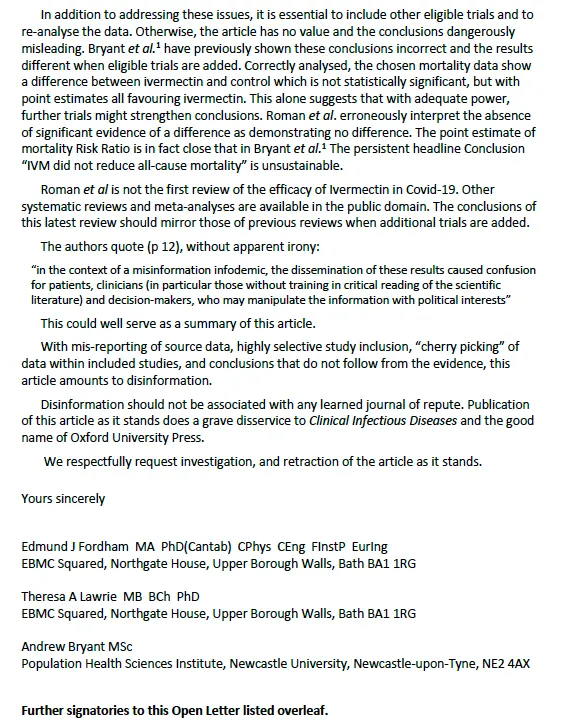
Matthew Crawford, the brilliant polymath, educator, writer, statistician, data-analyst, mathematician, and author of the Substack Rounding the Earth, wrote an even more scathing critique here, with the great line, “this stands out as the single sloppiest paper I have ever encountered published in a medical journal or junior high newspaper.”
Yet, Roman et al was cited heavily in all subsequent ivermectin reviews and editorials. Good times.
Now, probably the most devastating meta-analysis was that of your friend and mine, Dr. Andrew Hill. Remember, I have argued previously that it is my belief that “Andy,” the lead researcher of the UNITAID/BMGF team researching repurposed drugs in COVID had initially determined ivermectin to be amazingly effective. That is, until he got“turned” twice by Pharma and his employer Gates. The first time was when he let Unitaid/BMGF write his paper for him, arguing against ivermectin’s adoption.
But what Andy did beyond that is truly astonishing. One of the best examples I use to defend my belief above is that Andy, after his contract with Unitaid was over, independently published a phenomenally powerful and insanely positive meta-analysis in the Journal of Clinical Infectious Disease which found that, among the 24 RCT’s he included, statistically significant reductions in mortality, hospitalization, time to viral clearance, and time to clinical recovery were found.
Note this meta-analysis work was done after his contract with Unitaid ended April 1, 2021. He wanted to publish a more updated and comprehensive meta-analysis by himself, you know, for the sake of science and the world. So he did. I have personal knowledge that this post-Unitaid meta-analysis was funded by the wonderful Rainwater Foundation, an philanthropic organization that made a commitment to try to impact the COVID response as positively as they could by funding research into repurposed drugs (among other efforts). In fact, I just learned from someone I know there that they have recently started to fund research into treatments for tinnitus (ringing in the ears). I was so thrilled to learn of this given this horrific problem is highly prevalent among patients I see in my practice focusing on COVID vaccine injury and long haul syndromes. Tinnitus is a bitch to treat, I have had some successes for sure but it is hit or miss.. and mostly miss. But I keep trying, just recently I started trialing my patients on a non-invasive brain stimulator given its efficacy as reported in these two papers.
Anyway, back to Andy Hill and the insanely positive meta-analysis he wrote while receiving support from the Rainwater Foundation. Problem: this paper was really really bad for Pharma and the prospects of future contracts and funding for Andy. So, it is my belief that they went after him. They had to figure out a way for him to retract his paper. So they accused the ivermectin trialists of the same thing they were doing themselves – fraud.
The whole “fraud narrative” started when some nobody graduate student named Jack Lawrence reportedly was given an “assignment” (he got an assignment all right) to review ElGazzar’s paper and somehow allegedly got access to, in a literally improbable way (password =1234?) ElGazzar’s source data. The purported original source database was insanely sloppy with numerous duplicates and inconsistencies that it allowed good ole’ Jack to claim that ElGazzar fabricated his trial. Even a 3 year-old fabricating data would have done a better job. For what it is worth, ElGazaar told me privately that the database used publicly to support the accusations was NOT his source data. Problem: if true, he should have immediately and publicly released his source data. Alas, he did not. Only 2 conclusions – either it truly was fabricated, or.. he was asked to keep his head down and stay quiet. I favor the latter.
This supposed “scoop” then launched a new narrative (propaganda campaign) that all ivermectin studies might be fraudulent and thus the evidence base should not be trusted. Again, Professor ElGazzar and his University went quiet and fast as this narrative unfolded. I have addressed this ElGazzar issue before, but I will re-state my belief that his paper was a sacrificial lamb. Pharma wanted to prove that the most positive RCT on ivermectin was fraudulent. Injecting doubt where there is none. If they could pull that off, they could spread the doubt even further, across the entire evidence base. This is what they do.
After this ElGazzar “scandal” erupted, the editor of the journal where Tess and Andy Bryant’s review paper and the FLCCC’s review paper were published asked us to revise our reviews. Both research teams simply removed ElGazzar’s study from our calculations, a revision which led to zero difference in our conclusions aside from a small decrease in the estimated mortality reduction.
Andy did something completely different (like out of the Monty Python movie).
He instead self-retracted his own paper entirely, removed ElGazzar from his analysis and then employed a completely new approach to analyzing the evidence base compared to the accepted, standard approach he had employed in his first, immensely positive version.
Shocker: his “revised” version led to an opposite conclusion from his original one.
Original abstract conclusion, just read the bolded parts:
This meta-analysis investigated ivermectin in 24 randomized clinical trials (3328 patients) identified through systematic searches of PUBMED, EMBASE, MedRxiv and trial registries. Ivermectin was associated with reduced inflammatory markers (C-Reactive Protein, d-dimer and ferritin) and faster viral clearance by PCR. Viral clearance was treatment dose- and duration-dependent. In 11 randomized trials of moderate/severe infection, there was a 56% reduction in mortality (Relative Risk 0.44 [95%CI 0.25-0.77]; p=0.004; 35/1064 (3%) deaths on ivermectin; 93/1063 (9%) deaths in controls) with favorable clinical recovery and reduced hospitalization. Many studies included were not peer reviewed and a wide range of doses were evaluated. Currently, WHO recommends the use of ivermectin only inside clinical trials. A network of large clinical trials is in progress to validate the results seen to date.
Ok. make sure you are sitting down, but after the ELGazzar “scandal,” not only did he retract the above paper to “revise” it, but what he republished came with a shiny, sparkly new title:
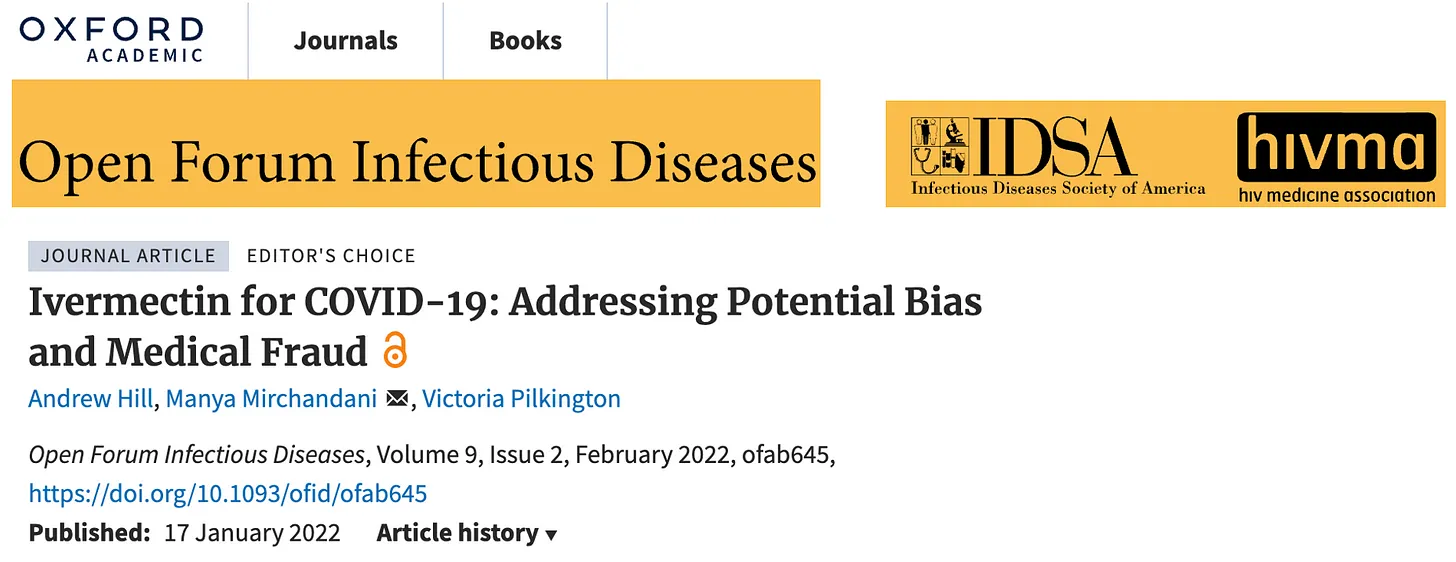
Check out the new, revised conclusions of the abstract, focus on the bolded parts:
This meta-analysis investigated ivermectin in 23 randomized clinical trials (3349 patients) identified through systematic searches of PUBMED, EMBASE, MedRxiv, and trial registries. The primary meta-analysis was carried out by excluding studies at a high risk of bias. Ivermectin did not show a statistically significant effect on survival (risk ratio [RR], 0.90; 95% CI, 0.57 to 1.42; P = .66) or hospitalizations (RR, 0.63; 95% CI, 0.36 to 1.11; P = .11). Ivermectin displayed a borderline significant effect on duration of hospitalization in comparison with standard of care (mean difference, –1.14 days; 95% CI, –2.27 to –0.00; P = .05). There was no significant effect of ivermectin on time to clinical recovery (mean difference, –0.57 days; 95% CI, –1.31 to 0.17; P = .13) or binary clinical recovery (RR, 1.19; 95% CI, 0.94 to 1.50; P = .15). Currently, the World Health Organization recommends the use of ivermectin only inside clinical trials. A network of large clinical trials is in progress to validate the results seen to date.
Oh Andy. How did he pull the above off? Well, he brazenly removed all the high-risk studies (not standard) and then he went further and invented novel, never-before-described grading categories such as “studies that are potentially fraudulent” and “studies that have some concerns.” I challenge anyone to find a generally accepted, validated definition of a study that is “potentially fraudulent” or “has some concerns.” Using these categories, he then whittled the evidence base down to just 4 RCT’s. This allowed him to proudly report to his masters that “there was no statistically significant reduction in mortality.” They must have been so pleased. Murderer.
The best way to demonstrate visually what he did above is found in this ridiculous NEJM editorial, written to magnify his “new” findings” to the world. Notice the derogatory graphic trying to symbolize ivermectin as “stinky cheese” in NEJM:
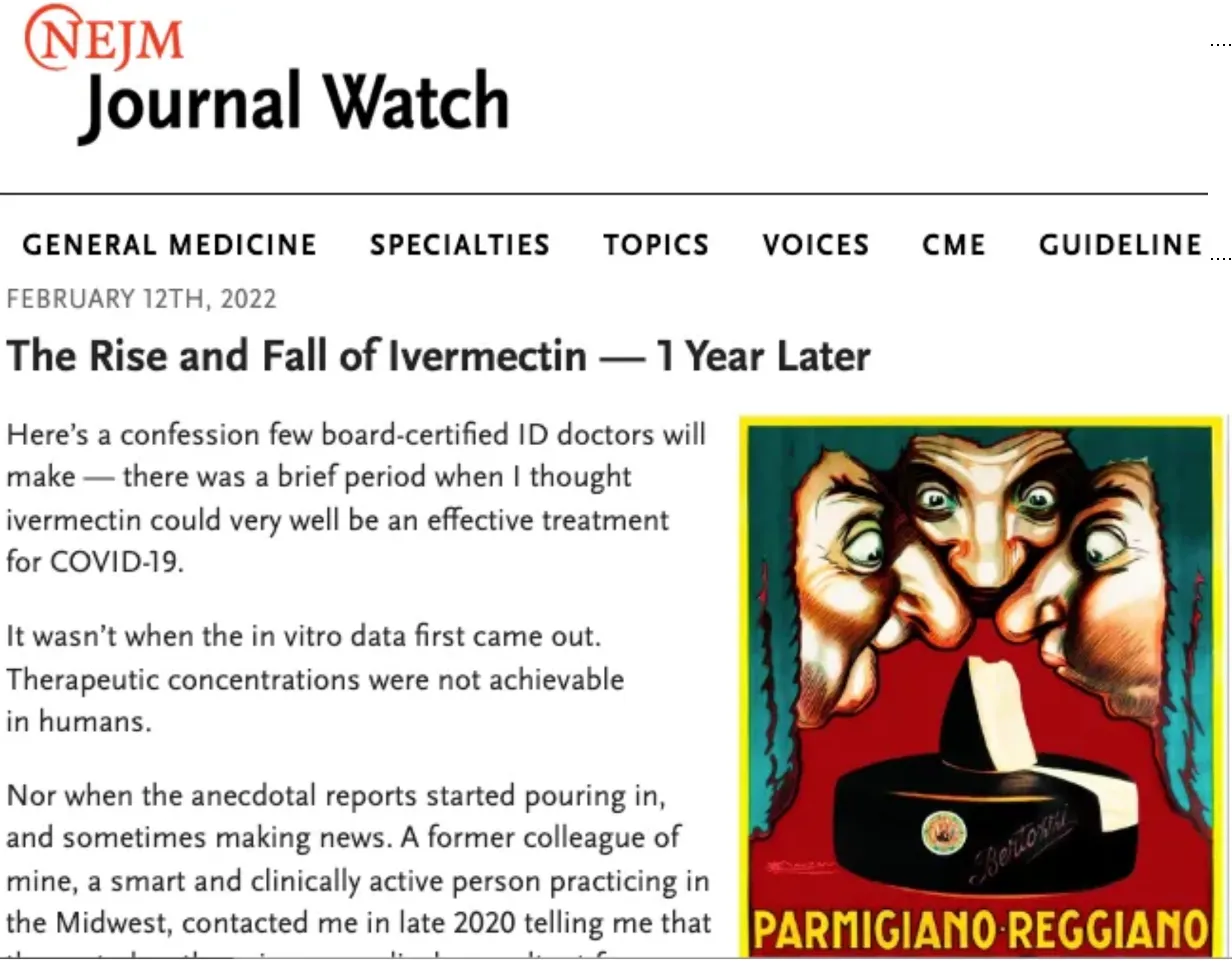
Now, check out the below graph from the editorial above visually detailing how Andy “disappeared” the statistical significance supporting ivermectins efficacy to save lives. What is really, really hilarious is that the highest-impact medical journal in the world had zero qualms about inserting Andy’s completely invented grading categories. The below reads like the work of a 5 year-old trying to “prove something.”
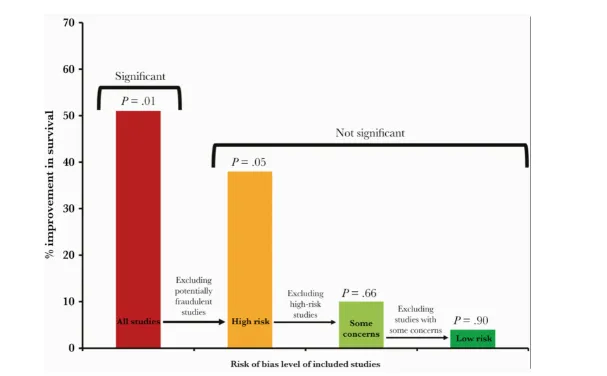
Again, the above graph was published in the New England Journal of Medicine. My god.
Onwards with more negative editorials published in the high-impact journals like this insane paper, which technically is a study reporting original data, but, trust me, it is not. It is a 100% commissioned hit job on ivermectin. Note I have zero evidence to support this statement except to say that Pharma. Does. Not. Play.
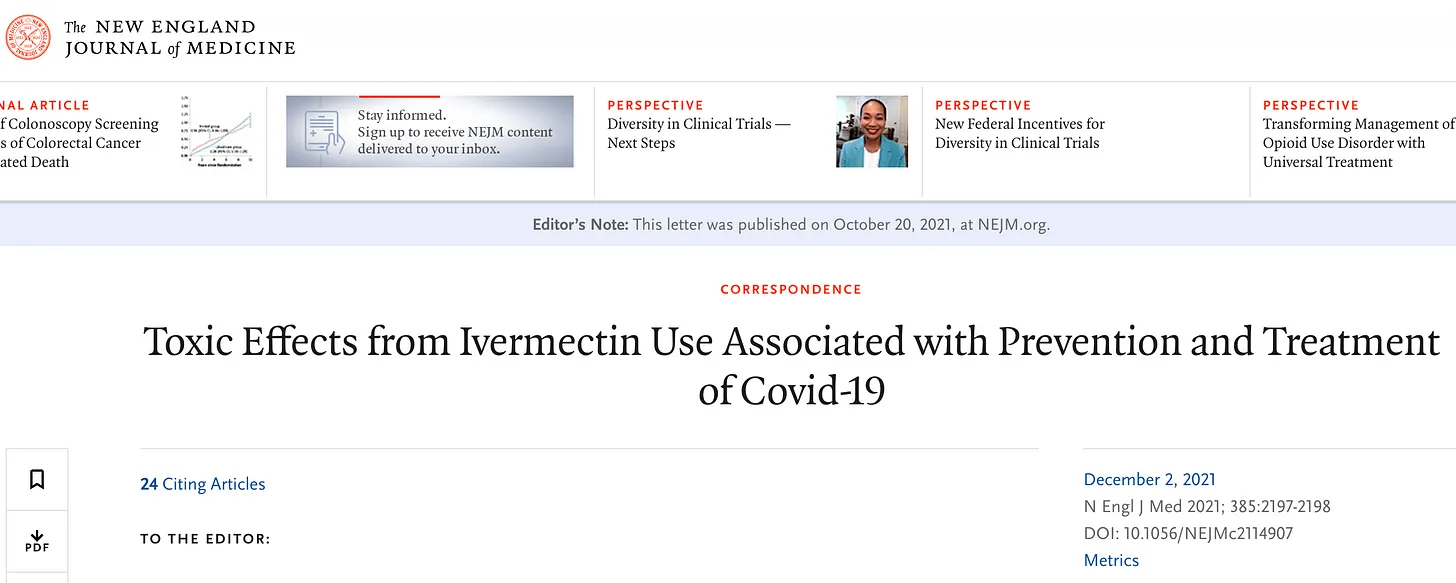
Just give me some props for my pattern recognition in detecting bullshit. I knew this was a planted hit job as soon as I saw the title. All I can say is that one of the top toxicologists in the world, Dr. Jacques DesCotes, did an exhaustive and comprehensive review of the toxic effects of ivermectin in 2021, commissioned by the French Bio-tech company MedinCell which was trying to develop long acting injectable formulations of ivermectin for malaria prevention (with the potential for use against COVID!) I would take an ivermectin shot before I would ever take a COVID mRNA shot, and so would the entire world if it were an option. Some quotes from the review, which, by the way, was not referenced in the above article (subtle eh?).
“no safety concern is anticipated that would prevent health authorities from assessing the use of Ivermectin against Covid-19 as a new indication.”
“It is noteworthy that no deaths have seemingly ever been reported after an accidental or suicidal overdose of ivermectin. No greater toxicity of ivermectin has been substantiated in elderly people despite repeated assertions that an ageing blood-brain barrier might lead to increased ivermectin toxicity level. The positive clinical experience accumulated with ivermectin administration led many medical experts to break away from early adamant contraindications in pregnant women. Finally, several national pharmacovigilance networks around the world released information and opinions to ascertain ivermectin safety in human subjects. So far, there are no critical safety limitations to ivermectin prescription in current indications.”
“I also want to point out that no severe adverse event has been reported in dozens of completed or ongoing studies involving thousands of participants worldwide to evaluate the efficacy of ivermectin against COVID-19.” *
What I find disturbing is that I used to reference Desquotes’ review by using the link to the website of Medincell where I could find it easily. Now I cant find the link to the review. Hmm.
OK, Last one. The BMJ gets in on the action and proudly publishes this piece of crap editorial which spews every single anti-ivermectin narrative. My favorite is the cry for papers written by authors without “conflicts of interest.” Yup.
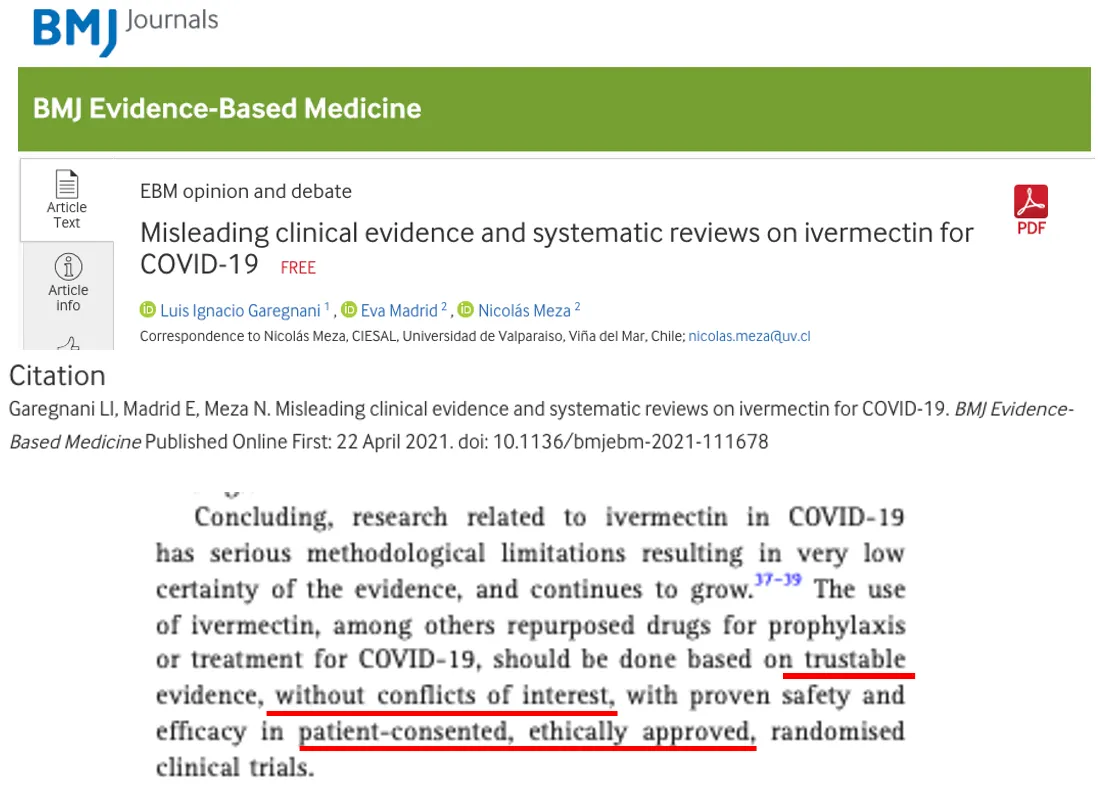
Recall that the lead author of the above (Luis Garignani), is the guy who I destroyed in a webinar debate about ivermectin on TrialSite News.
In summary of my “investigation” into the actions of the world’s highest-impact medical journals, the selective rejections and retractions of positive ivermectin studies whilst publishing only negative, fraudulent ivermectin studies and editorials was the absolute core of Pharma’s weaponry against ivermectin.
The high-impact journals are “Science.” Following “the science” demands you prioritize the studies in those journals as the “best, most rigorous” studies. The fact that the investigators of those studies are literally paid by Pharma somehow, to this day, does not dent the faith of physicians who as a whole, trust “the Science” in those journals.
Ok, I am officially done writing about the nefarious and criminal control of the high-impact medical journals in the pandemic. Next topic to cover is the major media propaganda campaigns against ivermectin which the “science” above supported. Part 1 will cover all the hit jobs on me, Paul Marik, Peter McCullough, Robert Malone etc. and Part 2 will cover the insanely effective “horse dewormer campaign” launched by the collaborative and timed efforts of Fauchi, the FDA and the CDC.
I just want to say thanks to all my subscribers, especially the paid ones! Your support is greatly appreciated as it allows me to devote what is often large amounts of time I spend researching and writing my posts, so again, thanks.
P.S. I opened a tele-health clinic providing care not only in the prevention and treatment of acute COVID, but with a specialized focus on the study and treatment of both Long-Haul and Post-Vaccination injury syndromes. If anyone needs our help, feel free to visit our website at www.drpierrekory.com.
P.P.S We held the world’s first conference on understanding and treating Spike protein induced disease this past weekend (i.e long haul COVID and vaccine injury syndromes). All the recorded lectures will be available for download next week on the FLCCC website. Link in my next post.

P.P.P.S. I am writing a book about what I have personally witnessed and learned during Pharma’s historic Disinformation war on ivermectin. Pre-order here for:
